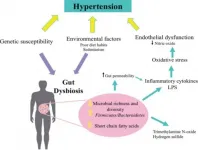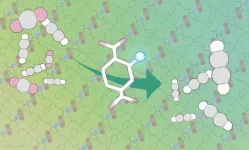CU cancer researcher wins two awards to study drug-resistant cancer cells
University of Colorado Boulder researcher Sabrina L. Spencer, PhD., recently won the Damon Runyon-Rachleff Innovation Award (from the Damon Runyon Cancer Research Foundation) and the Emerging Leader Award (from The Mark Foundation for Cancer Research)
2021-03-19
(Press-News.org) Sabrina L. Spencer, PhD, is a CU Boulder researcher and a CU Cancer Center member. Spencer recently won two awards: the Damon Runyon-Rachleff Innovation Award (from the Damon Runyon Cancer Research Foundation) and the Emerging Leader Award (from The Mark Foundation for Cancer Research). The preliminary research she used to apply for the grants, "Melanoma subpopulations that rapidly escape MAPK pathway inhibition incur DNA damage and rely on stress signalling," was published in Nature Communications on March 19, 2021. We spoke to Spencer about the awards and how she plans to use them to further her research.
Q: What is the focus of your research?
The work is about understanding where drug resistance comes from in cancer. It's a well-known problem, and it's particularly prominent with targeted therapeutics. These drugs usually work great at first, but then, after some time, there's relapse.
A lot of people have focused on trying to understand what mutations in those relapsed tumors make the drugs stop working. But in a way, that's a little too late. Because the question is, how did those cells survive in the first place to be able to acquire the mutations to become drug resistant? We wanted to look at the first few days of drug treatment to understand whether you can already see cells adapting in a non-genetic way in order to evade the drugs.
Q: You're watching cells become drug resistant in real time? How does that work?
We use time-lapse microscopy to study this process. We're particularly adept at time-lapse imaging of single cells, where we film single cancer cells over several days and watch them proliferating. Then we hit them with the drugs and watch the drugs block the cells from proliferating. Then, after a couple of days, we can see a subset of cells start proliferating again.
Q: What sparked your interest in this research?
I've always been interested in outliers. And I've always been interested in cancer cells, because they have such an interesting mixture of adaptive and maladaptive features -- features that make them proliferate faster but are an Achilles heel as well. I like the philosophical juxtaposition of combining that with this idea of outliers and heterogeneity. Every cell is unique. Even genetically identical cells aren't truly identical, because they could have a little more of protein X and a little less of protein Y at any given moment. When it comes to drug resistance, these chance events can make a cell an outlier on one particular day, and that could be the day the drug comes along. Now that cell has a completely different fate.
Q: You just won two awards to further this research. What was that like?
I submitted a very similar grant application to both, because each funding agency only gives out a handful of these awards. I didn't think this would be a problem, because I wasn't expecting to get either one! Then I found out that I had gotten both and thought I'd have to choose between them, but when I reported my situation to the two foundations, they said, "Don't you worry about it. We'll sort it out." And they decided to co-fund the grant.
Q: How will you use the grant?
One of the things we saw about the cells that escaped the drugs -- cells we have dubbed escapees -- is that they have DNA damage. That's curious, because these drugs are not supposed to be mutagenic. So the first aim of the grant is to understand how these drugs are causing DNA damage. The second finding is the activation of a stress response pathway called ATF4. That pathway is super high in the escapees, but not the non-escapees and not the untreated cells. We know that if you knock that pathway down, you get fewer escapees, but we don't really understand what that pathway is doing for the escapees. Is it helping them escape the drugs? Or is it just helping them survive the stress of cycling in the presence of the drugs? So that's the second aim of the grant, to understand how this ATF4 stress response pathway is enabling or promoting drug escape.
INFORMATION:
[Attachments] See images for this press release:

ELSE PRESS RELEASES FROM THIS DATE:
2021-03-19
Researchers looking at miniscule levels of plutonium pollution in our soils have made a breakthrough which could help inform future 'clean up' operations on land around nuclear power plants, saving time and money.
Publishing in the journal Nature Communications, researchers show how they have measured the previously 'unmeasurable' and taken a step forward in differentiating between local and global sources of plutonium pollution in the soil.
By identifying the isotopic 'fingerprint' of trace-level quantities of plutonium in the soil which matched the ...
2021-03-19
A study of Japanese university students and recent graduates has revealed that writing on physical paper can lead to more brain activity when remembering the information an hour later. Researchers say that the unique, complex, spatial and tactile information associated with writing by hand on physical paper is likely what leads to improved memory.
"Actually, paper is more advanced and useful compared to electronic documents because paper contains more one-of-a-kind information for stronger memory recall," said Professor Kuniyoshi L. Sakai, a neuroscientist at the University of Tokyo and corresponding author of the research recently published in Frontiers in Behavioral Neuroscience. The research was completed with collaborators from the NTT Data Institute of Management Consulting.
Contrary ...
2021-03-19
Philadelphia, March 19, 2021 - In recent years, fermented dairy foods have been gaining attention for their health benefits, and a new review published in the Journal of Dairy Science indicates these foods could help reduce conditions like hypertension (high blood pressure). A team of investigators from the Center for Food Research and Development in Sonora, Mexico, and the National Technological Institute of Mexico in Veracruz reports on numerous studies of fermented milks as antihypertensive treatments and in relation to gut microbiota modulation. They also examine the potential mechanistic pathways of gut modulation through antihypertensive fermented milks.
In addition to the impact of genetics and the environment, there is growing ...
2021-03-19
During the first six months of the pandemic, as people attempted to stay away from hospitals caring for those sick with COVID-19, potentially avoidable hospitalizations for non-COVID-19-related conditions fell far more among white patients than Black patients, according to a new study that looked at admissions to UCLA Health hospitals.
The findings indicate that the COVID-19 crisis has exacerbated existing racial health care disparities and suggest that during the pandemic, African Americans may have had worse access than whites to outpatient care that could have helped prevent deterioration of their non-COVID-19 health conditions, said Dr. ...
2021-03-19
LA JOLLA, CALIF. - March 19, 2021 - Scientists at Sanford Burnham Prebys Medical Discovery Institute have identified a drug candidate that blocks the uptake of glutamine, a key food source for many tumors, and slows the growth of melanoma. The drug is a small molecule that targets a glutamine transporter, SLC1A5, which pumps the nutrient into cancer cells--offering a promising new approach for treating melanoma and other cancers. The study was published in the journal Molecular Cancer Therapeutics.
"While great strides have been made recently in the treatment of melanoma, many patients' tumors become resistant to therapy, and this has become a major obstacle in the successful treatment of the disease," says Ze'ev ...
2021-03-19
A more energy-efficient method improves how an industrial gas is purified by reversing the traditional process. The concept was developed and successfully tested by scientists at Kyoto University's Institute for Integrated Cell-Material Sciences (iCeMS) in Japan and colleagues. The findings were reported in the journal Angewandte Chemie International Edition.
Acetylene is a gas used in many industries, including as a fuel in welding and a chemical building block for materials like plastics, paints, glass and resins. To produce acetylene, it first needs to be purified from carbon dioxide. Traditionally, this is done by passing the acetylene/carbon ...
2021-03-19
Colorectal cancer survivors who maintained a stable body weight but lost muscle and developed fatty deposits in their muscles faced a 40 percent higher risk of premature death than patients who avoided both health issues.
"The conventional wisdom has been that colorectal cancer patients should avoid losing or gaining weight during treatment," said Dr. Justin C. Brown, Assistant Professor and Director of the Cancer Metabolism Program at Pennington Biomedical Research Center. "But maintaining your weight does not mean your body composition remains the same. Muscle can ...
2021-03-19
COVID-19 vaccines being rolled out in the UK are effective in preventing severe disease, but the extent to which they prevent against infection is still unclear.
First modelling study looking at relaxing control measures (eg, mask wearing, physical distancing, and lockdown measures) and planned vaccination rollout in the UK suggests that vaccination alone may not be enough to prevent the spread of infection - with the R number estimated to be 1.58 even if the vaccine prevents 85% of new infections occurring, after vaccine rollout is complete and all other control measures are removed.
Relaxing control measures is highly likely to lead to another wave of infection, ...
2021-03-19
Reporting in the Lancet Psychiatry today, psychologists at the University of Bath highlight that a widely used technique for autism screening is being misused, which may have prevented many people from receiving an autism diagnosis over the past decade.
When individuals with suspected autism are assessed by a GP, a decision to refer them to a specialist for diagnosis is informed by using the Autism Spectrum Quotient. This ten-point scale, known as the 'AQ-10', is an internationally used technique, whereby individuals agree or disagree with statements such as 'I find it difficult to work out people's intentions'. ...
2021-03-18
URBANA, Ill. - Opioid use has dramatically increased in the 21st century, especially among young adults. A new study from the University of Illinois provides insights on usage patterns among Illinois high school students to help inform prevention and treatment strategies.
"The societal and personal costs of opioid misuse are massive. There's been a lot of focus on trying to understand how to combat the current epidemic. But we also need to make sure we have good data in order to know how we should apply our efforts," says Allen Barton, assistant professor in the Department of Human Development and Family Studies at U of I and lead author on the study.
The researchers based their study ...
LAST 30 PRESS RELEASES:
[Press-News.org] CU cancer researcher wins two awards to study drug-resistant cancer cells
University of Colorado Boulder researcher Sabrina L. Spencer, PhD., recently won the Damon Runyon-Rachleff Innovation Award (from the Damon Runyon Cancer Research Foundation) and the Emerging Leader Award (from The Mark Foundation for Cancer Research)





